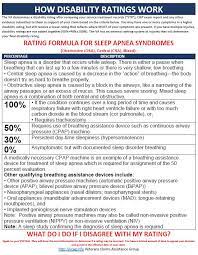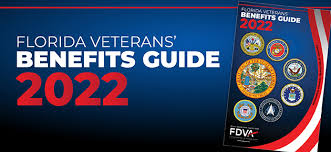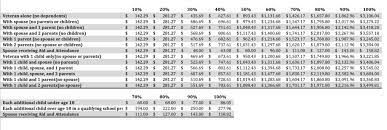VA Disability Sleep Apnea Eligibility Criteria
Sleep apnea is a common sleep disorder that affects many individuals, including veterans. It is characterized by pauses in breathing or shallow breaths during sleep, leading to disrupted sleep patterns and daytime fatigue. The Department of Veterans Affairs (VA) recognizes sleep apnea as a qualifying condition for disability benefits, but there are specific eligibility criteria that need to be met.
Diagnosis
In order to be eligible for VA disability benefits related to sleep apnea, you must have a formal diagnosis of the condition from a qualified healthcare professional. This diagnosis should be based on a sleep study known as a polysomnography, which measures various aspects of your sleep patterns and respiratory function during the night.
Service Connection
The next step in determining eligibility is establishing a service connection. This means providing evidence that your sleep apnea was either caused or aggravated by your military service. This can be done through medical records, buddy statements, or other supporting documentation.
Severity Ratings
The severity of your sleep apnea will also play a role in determining your eligibility for VA disability benefits. The VA uses a rating system ranging from 0% to 100%, with higher ratings indicating more severe symptoms and limitations. The severity rating is determined based on the frequency and duration of breathing interruptions during sleep, as well as the impact on daily functioning.
Secondary Conditions
In some cases, sleep apnea may lead to the development of other medical conditions. These secondary conditions can also be considered when determining eligibility for VA disability benefits. For example, if you have developed hypertension or cardiovascular problems as a result of your sleep apnea, these conditions may qualify you for additional compensation.
Evidence and Documentation
When applying for VA disability benefits for sleep apnea, it is crucial to provide thorough and accurate evidence and documentation. This includes medical records, sleep study results, service records, and any other relevant information that supports your claim. The more comprehensive your evidence, the stronger your case will be.
Seeking Professional Assistance
Navigating the VA disability claims process can be complex and overwhelming. It is highly recommended to seek professional assistance from a qualified veterans’ advocate or attorney who specializes in VA claims. They can help guide you through the process, gather necessary evidence, and ensure that your claim is properly presented.
In conclusion, if you are a veteran suffering from sleep apnea and believe it is related to your military service, you may be eligible for VA disability benefits. By meeting the diagnosis criteria, establishing a service connection, understanding severity ratings, considering secondary conditions, providing sufficient evidence and seeking professional assistance if needed, you can increase your chances of receiving the benefits you deserve.
9 Key Advantages of VA Disability Eligibility Criteria for Veterans with Sleep Apnea
- Recognition of sleep apnea as a qualifying condition for VA disability benefits.
- Formal diagnosis from a qualified healthcare professional is required.
- Establishing a service connection can help prove the link between sleep apnea and military service.
- Severity ratings determine the level of compensation, ensuring fair evaluation based on symptoms and limitations.
- Secondary conditions resulting from sleep apnea may also qualify for additional compensation.
- Thorough evidence and documentation strengthen the case for eligibility.
- Professional assistance from veterans’ advocates or attorneys can navigate the complex claims process effectively.
- VA disability benefits provide financial support to veterans suffering from sleep apnea-related issues.
- Eligibility criteria ensure that deserving veterans receive the care and compensation they need.
Six Challenges Veterans Face with VA Disability Sleep Apnea Eligibility Criteria
- Strict Diagnosis Requirement
- Burden of Proof
- Subjective Severity Ratings
- Lack of Secondary Condition Consideration
- Insufficient Documentation
- Complex Claims Process
Recognition of sleep apnea as a qualifying condition for VA disability benefits.
The recognition of sleep apnea as a qualifying condition for VA disability benefits is a significant pro. It acknowledges the impact that sleep apnea can have on veterans’ lives and provides them with the support they need. By recognizing sleep apnea as a qualifying condition, the VA ensures that veterans with this condition can access the necessary resources and compensation to improve their quality of life. This recognition demonstrates an understanding of the unique health challenges that veterans face and highlights the commitment to providing them with the care they deserve.
Formal diagnosis from a qualified healthcare professional is required.
One significant advantage of the VA disability sleep apnea eligibility criteria is that a formal diagnosis from a qualified healthcare professional is required. This requirement ensures that individuals seeking disability benefits have received an accurate diagnosis based on thorough medical evaluation. It helps to establish the legitimacy and seriousness of the condition, preventing false claims or misdiagnoses. By mandating a formal diagnosis, the VA can ensure that deserving veterans receive the support and compensation they need for their sleep apnea-related challenges.
Establishing a service connection can help prove the link between sleep apnea and military service.
Establishing a service connection is a crucial pro of VA disability sleep apnea eligibility criteria, as it allows veterans to prove the link between their sleep apnea and their military service. By providing medical records, buddy statements, or other supporting documentation, veterans can demonstrate that their sleep apnea either originated or worsened during their time in the military. This connection is essential for veterans to receive the disability benefits they deserve and ensures that their service-related health issues are properly recognized and addressed.
Severity ratings determine the level of compensation, ensuring fair evaluation based on symptoms and limitations.
One significant advantage of the VA disability sleep apnea eligibility criteria is the use of severity ratings to determine the level of compensation. This approach ensures a fair evaluation that takes into account the specific symptoms and limitations experienced by individuals with sleep apnea. By assigning higher ratings to more severe cases, the VA acknowledges the impact that sleep apnea can have on daily functioning and quality of life. This system helps to ensure that veterans receive appropriate compensation that reflects the severity of their condition, providing a fair and just evaluation process.
Secondary conditions resulting from sleep apnea may also qualify for additional compensation.
One significant advantage of the VA disability sleep apnea eligibility criteria is that secondary conditions resulting from sleep apnea may also qualify for additional compensation. Sleep apnea can lead to the development of other medical conditions such as hypertension or cardiovascular problems. By recognizing these secondary conditions as eligible for compensation, the VA acknowledges the potential impact and interconnectedness of sleep apnea on overall health. This provision ensures that veterans receive comprehensive support and compensation for any related health issues stemming from their sleep apnea diagnosis, promoting their overall well-being and quality of life.
Thorough evidence and documentation strengthen the case for eligibility.
Thorough evidence and documentation play a crucial role in strengthening the case for eligibility when it comes to VA disability sleep apnea criteria. By providing comprehensive medical records, sleep study results, service records, and any other relevant information, veterans can present a compelling case to the Department of Veterans Affairs. Strong evidence not only helps establish a formal diagnosis but also supports the connection between sleep apnea and military service. It demonstrates the severity of the condition and its impact on daily functioning. By ensuring all necessary documentation is in order, veterans can significantly increase their chances of receiving the disability benefits they rightfully deserve.
Professional assistance from veterans’ advocates or attorneys can navigate the complex claims process effectively.
One significant advantage of the VA disability sleep apnea eligibility criteria is the availability of professional assistance from veterans’ advocates or attorneys. Navigating the complex claims process can be overwhelming for veterans, especially when it comes to gathering evidence and presenting their case effectively. However, with the help of experienced advocates or attorneys who specialize in VA claims, veterans can receive valuable guidance and support. These professionals understand the intricacies of the system and can navigate through the paperwork, ensuring that all necessary evidence is provided and that the claim is presented in a compelling manner. Their expertise increases the chances of a successful outcome, allowing veterans to receive the benefits they rightfully deserve for their sleep apnea condition.
VA disability benefits provide financial support to veterans suffering from sleep apnea-related issues.
VA disability benefits for sleep apnea provide crucial financial support to veterans who are suffering from sleep apnea-related issues. This pro of the eligibility criteria ensures that veterans can receive compensation for the challenges they face due to their condition. The financial assistance can help cover medical expenses, treatment costs, and provide much-needed support for daily living expenses. By providing this financial support, the VA recognizes the impact that sleep apnea can have on a veteran’s quality of life and aims to alleviate some of the financial burdens associated with managing this condition.
Eligibility criteria ensure that deserving veterans receive the care and compensation they need.
The eligibility criteria for VA disability sleep apnea ensure that deserving veterans receive the care and compensation they need. By establishing specific requirements such as diagnosis, service connection, severity ratings, and documentation, the VA aims to accurately identify those veterans who are genuinely affected by sleep apnea due to their military service. This helps prevent any misuse or abuse of the benefits system while ensuring that those who truly require assistance receive the necessary support. The criteria act as a safeguard to guarantee that deserving veterans are able to access the care, treatment, and compensation they deserve for their service-related sleep apnea condition.
Strict Diagnosis Requirement
One of the challenges associated with the eligibility criteria for VA disability sleep apnea benefits is the strict requirement for a formal diagnosis from a qualified healthcare professional. This can pose difficulties for some veterans, particularly those who have limited access to medical resources. Obtaining a formal diagnosis may involve long wait times, limited availability of sleep study facilities, or geographical constraints that make it challenging to access specialized healthcare providers. These barriers can create obstacles for veterans seeking to establish their eligibility and receive the benefits they deserve.
Burden of Proof
One con of the VA disability sleep apnea eligibility criteria is the burden of proof required to establish a service connection between sleep apnea and military service. This can be a challenging task for veterans, as they need to provide compelling evidence demonstrating that their condition was caused or aggravated by their time in the military. Gathering the necessary documentation and medical records can be time-consuming and complex, adding an additional layer of difficulty to an already burdensome process. This requirement may pose a significant challenge for veterans seeking disability benefits for sleep apnea, potentially delaying or even denying them the compensation they deserve.
Subjective Severity Ratings
One potential drawback of the VA disability sleep apnea eligibility criteria is the subjective nature of severity ratings. These ratings, used by the VA to determine compensation, may not always accurately reflect the true impact of sleep apnea on an individual’s daily life and functioning. Since severity ratings are based on factors such as frequency and duration of breathing interruptions during sleep, they may not fully capture other aspects such as daytime fatigue, cognitive impairment, or reduced quality of life. This subjectivity can lead to discrepancies in compensation and may leave some individuals feeling that their condition is not adequately recognized or compensated for.
Lack of Secondary Condition Consideration
One notable con of the VA disability sleep apnea eligibility criteria is the lack of consideration for secondary conditions. Sleep apnea can lead to the development of other health issues such as hypertension or cardiovascular problems. However, the current eligibility criteria may not always take these secondary conditions into account when determining compensation. This oversight can result in veterans not receiving appropriate compensation for the full extent of their health issues related to sleep apnea. It is important for the VA to recognize and consider the impact of these secondary conditions in order to provide fair and comprehensive support to veterans suffering from sleep apnea.
Insufficient Documentation
One con of the VA disability sleep apnea eligibility criteria is the challenge of insufficient documentation. Gathering comprehensive and accurate documentation to support a claim can be a daunting task, particularly for veterans who may face difficulties in accessing relevant medical records or understanding the required paperwork. This process can be time-consuming and overwhelming, adding an additional burden to veterans who are already dealing with the effects of sleep apnea. The lack of sufficient documentation may hinder their ability to present a strong case for eligibility, potentially impacting their chances of receiving the disability benefits they deserve.
Complex Claims Process
The complex claims process is a significant con of VA disability sleep apnea eligibility criteria. Navigating through the intricate web of regulations and procedures can be overwhelming and confusing for veterans. The extensive knowledge required to properly understand and complete the necessary paperwork often leads to delays or even denials in receiving benefits. This frustrating experience can be disheartening for eligible veterans who are seeking assistance and support for their sleep apnea condition.




